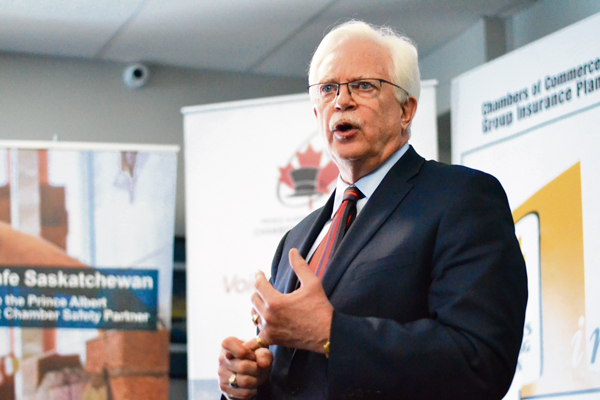
Chief Commissioner David Arnot said the Saskatchewan Human Rights Commission (SHRC) is hoping to work with Prince Albert stakeholders to improve accessible transportation within the city.
Arnot presented a speech in front of dozens of people on Thursday for a Prince Albert Chamber of Commerce Luncheon.
Mayor Greg Dionne, Coun. Don Cody, Northcote MLA Nicole Rancourt, Community Service Centre (CSC) CEO Bill Powalinsky and Saskatchewan NDP leader Ryan Meili were a few in attendance.
“Imagine yourself as an individual needing a wheelchair to get education, get employment, get to medical appointments, buy groceries, go to a movie,” said Arnot.
Back in 2012 in Regina, he said it was unlikely you could get accessible transportation to do these every day activities. The city only had two wheelchair accessible taxis that were in operation from 6 a.m. to 6 p.m.
However, the SHRC met with wheelchair users and city officials to collaboratively reduce the issue.
“Eighteen months after that meeting, there were 17 wheelchair accessible taxis in Regina. They work 24 hours, seven days a week. The paratransit denial rate went through the floor,” said Arnot.
Like the City of Regina, Arnot said he’s hoping to work with the City of Prince Albert to improve transportation for people with disabilities.
“I really think we need to work with you in a positive and constructive way to make sure that wheelchair users in the City of Prince Albert are treated the same as they are in Regina and Saskatoon,” he said.
“It needs to be improved in all cities in Saskatchewan,” he added in an interview after his speech.
Operated by the CSC, Prince Albert has five paratransit busses with lifts. Powalinsky said four busses run throughout the day, with one starting later on. One bus runs throughout the night.
“This has been a tough budget year and we’re continuing to work with Mayor Dionne and the council in finding ways to maintain our current level of service,” said Powalinsky.
In December 2019, Coun. Evert Botha’s amendment to the 2020 budget to give an additional $75,450 to the CSC for its paratransit service was voted down by a 7-2 margin.
In 2018, the service provided about 30,500 trips, but turned away more than 3,000 requests.
Nevertheless, Powalinsky said there’s been a huge advancement in accessible transportation in the past few years.
Powalinsky echoed an element of Arnot’s speech: that it’s important to not only have enough accessible transportation itself, but to make sure people are able to get to a bus stop.
The CSC’s paratransit service goes door-to-door, but other transit doesn’t.
Dionne said the City is working to make all civic-owned busses low riders, meaning the chassis can be lowered to the ground.
“If you’re in a wheelchair, how far away is that bus stop from your home? And in the middle of winter, how do you get there? How long do you have to wait?” questioned Powalinsky.
“It’s been very positive that the city has gone with what they call the kneeling busses, but the challenge is still to get people to the bus stop.”
Dionne agreed that the City has taken several steps forward when it comes to accessible transportation, adding “it’s one of our priorities and we continue to work on it.”
“Council has discussed it now, and we are going to give out two licenses away for taxis. We’re going to own them…and they have to be restricted to wheelchair accessible cabs,” he added.
He said the paratransit fleets are some of the newest in the province.
— with files from Jason Kerr

